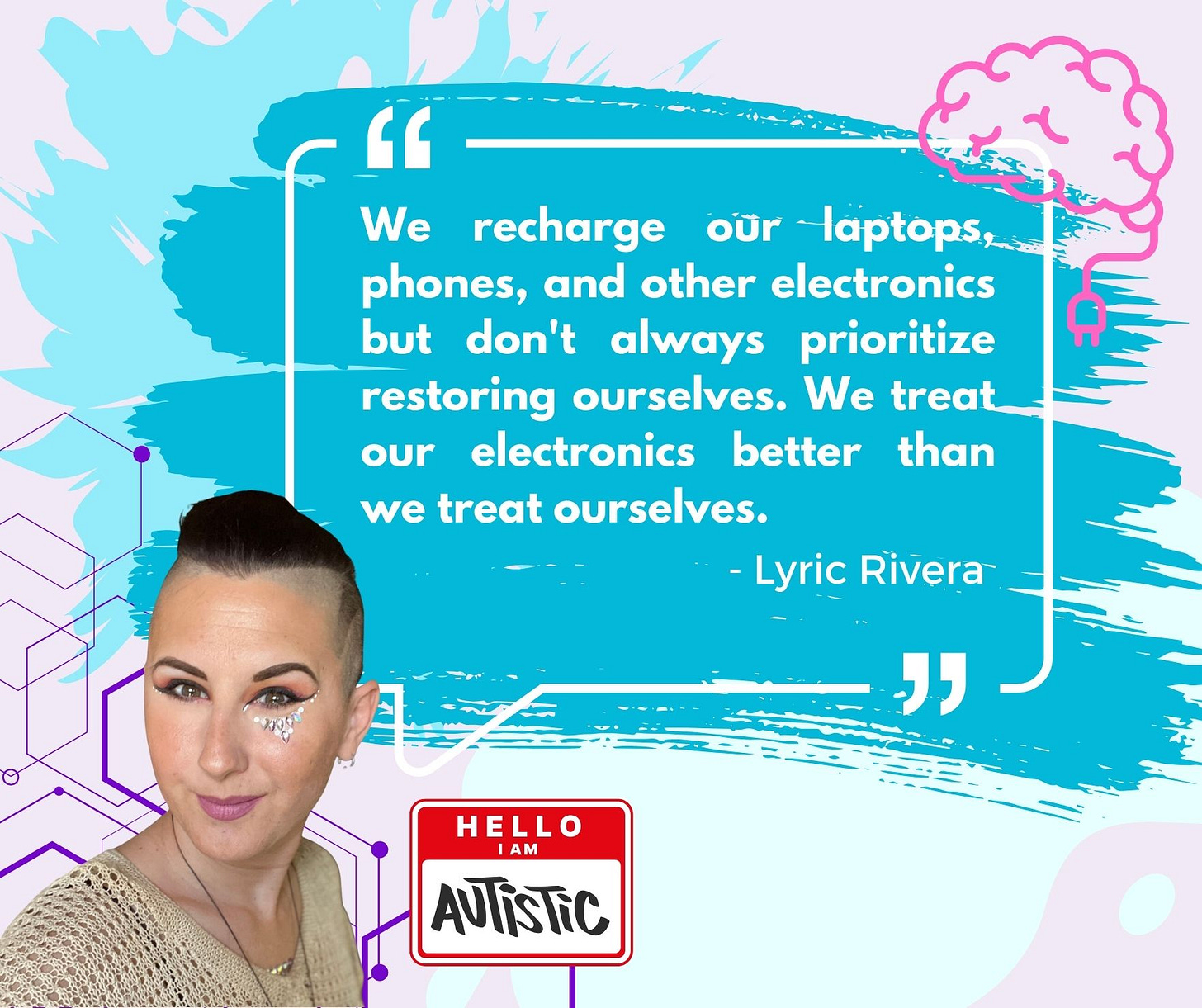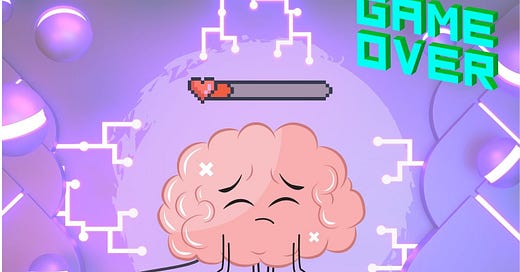Energy Regulation (Emotional, Sensory, Dopamine) for NeuroDivergent People
Energy, once created, cannot be destroyed. It can only converted from one form of energy to another.
Since discovering that I'm Autistic and ADHD (AuDHD) as an adult (only seven years ago), I have learned that I struggle with energy regulation.
When some people hear "energy regulation," they think of struggling to get out of bed in the morning, difficulty falling asleep, and possibly being hyperactive.
While all of these things can be true for people who struggle with energy regulation (and are accurate for me), struggling with energy regulation often means a lot more.
Humans are strange creatures, meat suits full of pulsing energy waves. When we die, the energy stops flowing through us and is returned to the earth.
Many different types of energies flow through us, but for this piece (and simplicity), I will stick to three that impact me the most greatly.
Emotional Energy
Our emotions can considerably impact the amount of energy we have in our bodies.
I am someone who experiences their feelings and emotions intensely thanks to a combination of Autism, ADHD, anxiety, and trauma.
Multiple forms of NeuroDivergence (in addition to what is listed above) can occur with intense emotional reactions and difficulty regulating emotional energy.
When I'm joyful, angry, excited, or anxious, energy surges through me (often more than is needed), causing discomfort, clouding my judgment, and hindering my impulse control.
If there's too much Energy pulsing through me (and I feel safe enough for my body to relax and do what it needs), the excess energy will radiate from me through excited rambling, humming, singing, other vocal sounds, and other motions (fidgeting or stimming) that help work the excess out of me.
If I don't get things under control and the emotional pressure keeps building, I may experience an emotional meltdown or another type of overload.
My emotions are intense in all directions. They can bring me up (where I feel overwhelmed by how much energy is flowing through me), and they can also bring me down (making me feel tired and heavy).
When I'm feeling sad or depressed, all the energy and ambitions I have quickly fade away, leaving me feeling low, tired, and unmotivated.
Sensory Energy
Sensory-sensitive NeuroDivergent People may have trouble regulating sensory energy, struggling to maintain a delicate balance of sensory input.
For those of us who are sensory-sensitive, we may need to avoid certain stimuli (that other people may have no problems with) to prevent ourselves from becoming over-energized (overloaded or overstimulated) by the world around us.
When sensory energy levels rise within sensory-sensitive humans, things can reach critical levels.
If energy isn't diverted (through stimming or other calming activities) and keeps growing, we can become overstimulated, resulting in overloads, overwhelms, and meltdowns.
We can be overstimulated in both good ways and bad ways.
Many sensory-sensitive humans seek things that give them glimmers (or are pleasurable sensory triggers that feel good).
When we overload ourselves in a good way, the sensation can be enjoyable, bordering on orgasmic. This is sometimes called sensory euphoria. This type of overload (the good kind) can help fight the painful and uncomfortable kinds of overload and serve as a way to create stimulation if someone is under-stimulated.
Just as sensory-sensitive humans can struggle with becoming overloaded via having too much sensory energy pulsing through them, they can also struggle from being under-stimulated or not having enough sensory energy flowing through their sensory systems.
When under-stimulated, we may experience restlessness, anxiety, and even meltdowns from insufficient sensory input.
Sensory-sensitive humans who are under-stimulated may seek to increase the sensory energy in their bodies.
While having too much energy in me (regardless of type) can make me feel like a shaken soda bottle or a volcano about to blow, not having enough of those "good sensory feelings" is harder to describe.
When I'm under-stimulated, I can be irritable, like there's an itch I need to scratch but cannot reach. Sensory seeking is like scratching that itch. It feels good and soothes me.
In ADHD circles, people often talk about dopamine regulation and seeking dopamine.
Dopamine is responsible for feelings of pleasure and reward. It also helps with emotional regulation. This is why ADHD is often treated using medications that increase dopamine (by targeting dopamine transporters).
I've been classified as having combined-type ADHD.
Combined-type ADHDers present in both hyperactive-impulsive and inattentive ways.
The inattentiveness is easy to miss (because it doesn't inconvenience and annoy others, as my hyperactivity seems to do).
While inattentiveness can mean not bringing enough energy to things that don't interest me, my hyperactivity means I OFTEN have more energy flowing through me than is required (or seen as appropriate) for the given situation.
I see dopamine as another type of energy many of us are chasing.
When we don't have enough dopamine, we can be irritable (because we lack a chemical our brain needs to work optimally).
ADHDers often seek pleasurable and rewarding things - this energizes us. We are trying to regulate, but many things in our world are set up to be tedious and draining.
Like sensory energy, where insufficient input can feel like an itch that needs scratching, having low dopamine can feel very similar, causing one to be irritable and uncomfortable in one's own skin.
Dopamine seeking is like scratching that itch, helping to ease the discomfort.
It's all about the regulation of the various types of bodily energy.
Energy in - Energy out:
Energy, once created, cannot be destroyed. It can only converted from one form of energy to another.
Subconscious Instinctive Movements
When energy is added to my system, it must go somewhere. I have to use it up, and my body instinctively does so through movements such as rocking, swaying, leg and foot bouncing, finger and toe tapping, or if I am standing, jumping, pacing, and spinning.
If I'm feeling low and slow, I instinctively cling to more down-paced, soothing activities that are more gentle and require less of me.

Intentional Movements for Regulation
Since learning about my NeuroDivergent brain, I've become much more aware of how to actively regulate my energy using physical activities like listening to music, dancing, exercising, making art, and playing.
Excess Energy MUST be Used.
When I have too much energy in my body, regardless of the type of energy, the best way to use the extra energy quickly is to move and "get physical." I could also use soothing, relaxing music to help calm me.
Low energy can (Sometimes) be Elevated.
Similarly, I can use intentional movements and other sensory tools to raise my energy if my levels are low.
If I feel down or sluggish, putting on a favorite, upbeat song, having a private dance party, sitting outside playing fetch with the dog, or walking in nature can be good ways to reengage with the world, bringing my energy (and spirits) up.
Staying in Balance
The key for many of us is finding ways to stay balanced.
Paid subscribers have access to the rest of this post as a thanks for their support.
Sharing is caring! Another way you can help support the work I do is by sharing this post (and it costs nothing but your time). It would mean the world to me.
Keep reading with a 7-day free trial
Subscribe to NeuroDivergent Rebel’s Substack to keep reading this post and get 7 days of free access to the full post archives.



